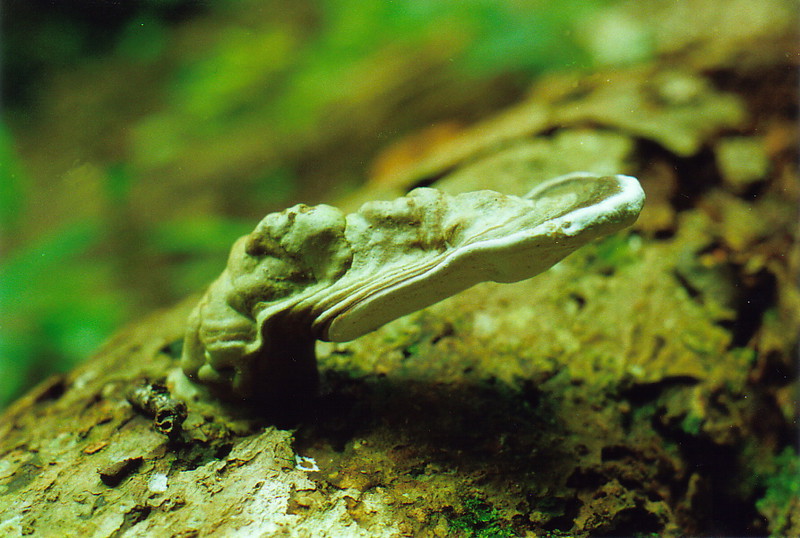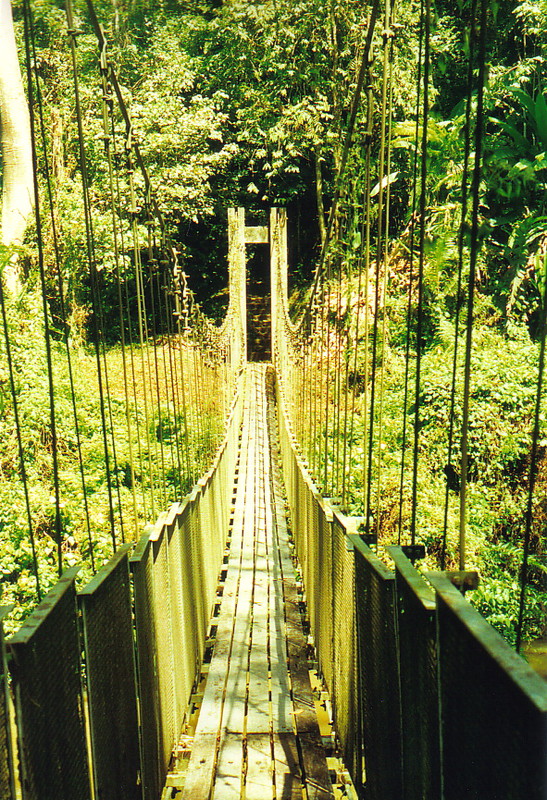
Appreciating a jungle from the inside is a little different from reading about it, but to get you in the mood for my visit to Taman Negara, here are some interesting facts that I've managed to glean from museums and books about Peninsular Malaysia's tropical rainforests:
-
Although it didn't feel like it when I walked through the rainforest, the annual rainfall in Taman Negara isn't that big, being between 2200 and 3800mm a year (for comparison, Milford in New Zealand gets over 8000mm a year). And, surprisingly, the temperature is a pleasant and stable 26°C in the day and 22°C at night (or 72°F and 79°F for Fahrenheit fans). However, the humidity is always around 90 per cent, whatever the precipitation and temperature, and that's why it's so uncomfortable.
-
The amount of sunshine doesn't make that much difference to the walker; as little as two per cent of sunlight makes it through the canopy to the forest floor, which explains why I was mostly unable to use my camera on the walk. It also explains the constant temperature under the canopy; it's like a greenhouse that doesn't let too much heat in, or too much out.
-
Malaysia seems to be ahead of even Australia when it comes to obsession with size; in KL there's the tallest building in the world, and connecting the island of Penang to the mainland is the longest bridge in Asia. Taman Negara itself clocks in a few world-beating wonders too: it is home to the world's largest flower, the Rafflesia, which has been known to grow up to 97cm across (3 ft) and weigh up to 9kg; the resort's 450m canopy walkway, a hanging walkway through the top layer of the rainforest, is the world's longest; the resident Atlas moth, with its 25cm wingspan, is one of the biggest moths in the world; there's a 55cm stick insect in the park, and yes, you guessed it, it's the biggest one in the world; the gaur, the largest species of wild cattle in the world, hangs around here too; and you can also find the tualang, the world's tallest tropical tree species, clocking in at a height of 80m. And on top of these record-breakers, there are the katydids, grasshoppers, crickets and 20cm-long cicadas who are responsible for the cacophony of background screeching, surely one of the loudest noises in the world after Indonesian bus music; one of the crickets even builds itself a concave amphitheatre to amplify the sound of its wings rubbing, just in case you thought you might be able to sleep out there...
-
There are between 300 and 600 Orang Asli in the park, all of them members of the Bateq tribe, the original inhabitants of the jungle. Of these, 150 are still fully nomadic, roaming within the boundaries of the park. However, it won't be long before modern intrusion does away with this way of life, whatever the park's authorities say; the government's intention to improve the population's standard of living applies to everyone, even if the people themselves might be happier in the jungle than in state housing.
-
Peninsular Malaysia has one of the most biologically diverse environments on the planet. The peninsula contains over 200 species of mammals, whereas Europe, which is 80 times larger, has only 170 native species; it contains more than 1000 species of butterfly, compared to the USA's 763 and the UK's 68; it contains 2398 species of tree, 27 per cent of which are endemic, whereas the Netherlands, for example, only has 30 native species; it contains 7900 species of seed plants, while the UK, which is 2.3 times bigger, has only 1430 species; it contains over 600 species of bird, compared to 470 in Europe; and it contains over 250 species of reptile, including 125 species of snake (21 of which are poisonous), whereas Europe has fewer than 90; and then there are over 800 species of orchid, over 200 species of palm, 90 types of frog and 150,000 types of insect – and they keep discovering more and more.
-
However, it's amazing how just one short-sighted species can manage to threaten the existence of so much diversity. Prime Minister Mahathir's government seems blissfully unaware of the danger that its logging programmes pose to the continued survival of this amazing diversity (or, rather, it chooses to ignore it). It's true that most of the logging in Malaysia takes place in Sarawak in northern Borneo, but it's a worrying fact that Malaysia is destroying its unprotected rainforests throughout the country; about 60 per cent of the country's rainforests have been logged, and some estimates give Sarawak's forests five to ten years before they've all been logged. It's true that the logging was originally started by the British in the 1930s, and it's also true that it's unfair to sit on one's ecological high-horse as a resident of a rich country, when another nation is simply trying to create wealth through exploiting its own natural resources; but some things are simply not on, such as the displacement of Sarawak's Dayak tribes to make way for logging concessions without even so much as a nod in the direction of human rights. Whatever the politics, I was surprised to read the following in the Taman Negara Information Centre:
The threat to the rainforests... Is there anything you can do? YES! There is something very important you can do! No matter what country you come from, you can help by restricting the number of children you have. All pressures on rainforest come from one basic cause: population increase. The more people we have in the world, the more the forested land is needed for other purposes. It is as simple as that. The future of the Malaysian rainforest is up to YOU.'
I believe this requires no comment when it's a stated government policy to increase Malaysia's population from the current 19.5 million to 70 million by 2020.
-
We'll end with a wonderful little quote from the meditation master himself, Gautama Buddha:
The forest is a peculiar organism of unlimited kindness and benevolence that makes no demands for its sustenance and extends generously the products of its life activity; it affords protection to all beings, offering shade even to the axe-man who destroys it.
Well said, Buddha. Let's hope Mahathir's Muslim Malaysia doesn't live to regret being the axe-man.
